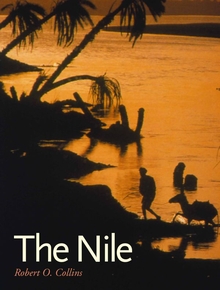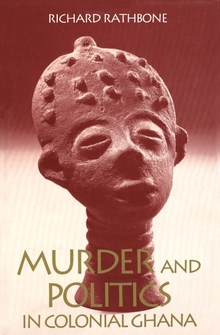The Nile
WARNING
You are viewing an older version of the Yalebooks website. Please visit out new website with more updated information and a better user experience: https://www.yalebooks.com
Robert O. Collins
The Nile is the longest river in the world. In its route from the Lake Plateau of East Africa to the Mediterranean, the Nile flows for more than four thousand miles through nine countries: Tanzania, Kenya, Congo, Burundi, Rwanda, Ethiopia, Uganda, the Sudan, and Egypt. The river begins in volcanoes and mountains with glacial snows and ends in arid deserts.
Throughout history, the banks of the Nile have been home to many peoples, from Bantu cultivators, Nilotic herdsmen, and Ethiopians in their highlands to the Sudanese, Nubians, and Egyptians on the plains below. No other river in the world has embraced such human diversity. But the huge and varied populations that have thrived on the waters of the Nile have also exerted extraordinary pressures on the river and its environment. From the early canals dug by the pharaohs to the building of the Aswan High Dam in 1971, civilizations have struggled to tame the Nile and control its resources. In The Nile, Robert Collins charts this dynamic interplay between man and nature in chronicling the past, present, and future of this great river.
Throughout history, the banks of the Nile have been home to many peoples, from Bantu cultivators, Nilotic herdsmen, and Ethiopians in their highlands to the Sudanese, Nubians, and Egyptians on the plains below. No other river in the world has embraced such human diversity. But the huge and varied populations that have thrived on the waters of the Nile have also exerted extraordinary pressures on the river and its environment. From the early canals dug by the pharaohs to the building of the Aswan High Dam in 1971, civilizations have struggled to tame the Nile and control its resources. In The Nile, Robert Collins charts this dynamic interplay between man and nature in chronicling the past, present, and future of this great river.
Robert O. Collins, emeritus professor of history at University of California, Santa Barbara, has written numerous books on the history of Africa, the Sudan, and the Nile. He has also worked as a professional river guide and has traversed most of the Nile.
A selection of the Science Book Club
“A compelling interdisciplinary study of Africa’s longest, most intensely studied, and most fabled river. Collins writes about the Nile with the same verve as the pharaohs did several millennia ago.”—Robert Tignor, Princeton University
“No Nile scholar knows their Nile sources better than Bob Collins. No historian has travelled as widely in the Nile Basin. None has the interdisciplinary reach and certainly none has had the half century of devotion to the river and with that the chance to speak to so many of the major Nile actors. Bob Collins’ latest Nile story is as informed, as accessible and as well written as his other inspiring books on this famous river.”—Professor Tony Allan, SOAS/King’s College London Water Research Group
"Collins uses a broad array of sources to paint a vivid portrait of one of the world’s great rivers. He ranges from the pharaohs to El Ninos, from British water engineers to the politics of the Aswan High Dam. This unique book raises important issues about the future of the Nile, issues whose roots lie deep in history. Anyone interested in modern Egypt and the Sudan will find a reliable guide to the Nile’s tumultuous and colorful history here."—Brian Fagan, University of California, Santa Barbara
“In an epic sweep across time and space, this book explores the lands and peoples of the Nile basin, the age-old effort to control its waters, and the bitter political battles over its ownership. This is environmental history at its best.”—Robert Harms, Professor of History, Yale University
"This is as much a biography of the Nile as it is a history, tracing not only its course through rain forest, savannah, swamp and desert, but its relationship to the various peoples that live alongside it and depend upon it, from the Hutus and Tutsis in the south to the Nubians and Arabs in the north. Collins brings both passion and erudition to his task; the science is there, but the romance is not forgotten."—Toronto Globe and Mail
“This scholarly and thoroughly impressive history of the Nile River provides a fine blend of geography and history as it surveys the river’s importance to local lives and world events. From its various ecological niches and environments to the special history of its evolution and importance to mankind, The Nile is filled from cover to cover with a wealth of lively and articulate description.”—Bookwatch
“A masterful piece that reflects a multidimensional knowledge of history, literature, hydro-engineering, and geography. It is written with both passion and accuracy, a scientific love-story between a curious scholar, nature, and human diversity. . . . It is admirably comprehensive and clear. . . . Collins’ book will remain required reading for generations.”—Haggai Erlich, Middle East Journal
"Collins tells the story of the river with forensic care, but also with passion and encyclopaedic knowledge. It is a compelling epic about a river he knows intimately, from almost half a century’s study and travel. . . . There is no better guide."—Fred Pearce, Times Higher Education Supplement
“Collins marries the beauty and diversity of the Nile Basin to issues of conservation and politics, and demonstrates why a cooperative, integrated approach to water distribution may be the last chance for one of the driest regions on earth.”—Maria Golia, Times Literary Supplement
“The book is an inspiration to read as one journeys the length of this mighty river with the author. . . . This book is environmental history at its very best.”—Mervyn Richardson, International Journal of Environmental Studies
“There may be an inordinate number of books about the Nile but this one is the best. It is a delight to find an author so at ease with his subject, and one who effectively combines a wealth of social history, scientific learning and political understanding to create a comprehensive and comprehensible account of this most tyrannical of rivers.”—Christopher Ondaatje, Literary Review
“With his book about The Nile, Robert Collins presents the story of the world’s longest river, written with great accuracy and a passion for the subject that the reader can feel. As a result it appeals both to scholars and to the general public. It is a work of political geography as well as of environmental history. . . . Collins’s ‘epic’ of the Nile should be read by everyone who is interested in Africa and the Middle East.”—Fouad Ibrahim, Geographical Reviews
Selected as an outstanding book by University Press Books for Public and Secondary School Libraries
ISBN: 9780300097641
Publication Date: October 11, 2002
Publication Date: October 11, 2002
280 pages, 7 x 9 1/4
48 b/w + 1 color illus. + 8 maps
48 b/w + 1 color illus. + 8 maps






